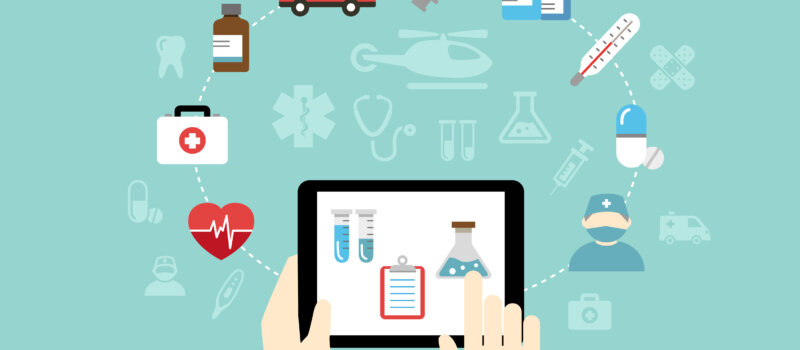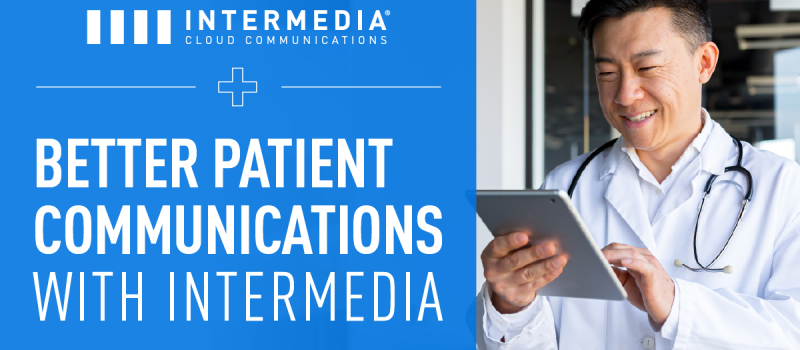In healthcare, mobile technology has multiple uses, such as enhancing the patient and provider experience and analyzing claim and clinical data. However, the COVID-19 pandemic launched the healthcare world into a new era of telemedicine. Now, mobile health (mHealth) has its fingerprints on every aspect of health, from prevention to the point of care.
Mobile healthcare solutions are continuing to rise, especially with the popularity of smartphones. At Intermedia, we understand the importance of mobile solutions in enhancing patient care, streamlining operations, and improving accessibility. In this guide, we discuss current trends, the benefits of using technology in the world of health, and how to implement it into your practice using our services.
What Is Mobile Technology in Healthcare?
Mobile technology in healthcare refers to how patients and medical providers use mobile devices and technology to receive wellness support and deliver effective care. mHealth uses tech devices to gather health data and diagnose and treat health conditions outside a traditional clinical setting. Some examples of popular mHealth tools include:
- Telemedicine: Telehealth solutions enable video consultations and bridge the gap between patients and care providers. This critical technology expands care access to remote areas and makes healthcare accessible to everyone.
- Health monitoring apps: Health monitoring apps integrate with wearable devices, such as fitness trackers, to monitor vital signs. Patients can track their sleep patterns, heart rates, and activity levels to share with healthcare providers or monitor their wellness. Providers can also continuously and remotely monitor patients with chronic conditions.
- Mobile electronic health record (EHR access): EHR apps allow healthcare practices to store, manage, and access patient data securely. They enhance collaboration, reduce administrative errors, and streamline workflows. Patients can also access their health information at any time.
The smartphone is at the center of mobile technology in healthcare because it allows patients to communicate with providers for advice and diagnoses. Additionally, with Android or iOS-based tablets, patients can reach professionals through secure video conferencing apps.
At Intermedia, we partner with healthcare practices to deliver secure, cloud-based communication and collaboration tools that support mobile devices in healthcare settings. Our contact center integrates with EHR apps to improve patient-provider communication, cut call volumes, and boost patient engagement.
Key Trends in Mobile Healthcare Technology
In 2025, mHealth incorporates advanced technologies to meet the changing needs of practitioners and patients. These key trends make healthcare accessible, improve the quality of care, and empower individuals to take control of their health. They include:
Telemedicine
Telemedicine allows healthcare providers to provide remote consultations, diagnoses, and treatments through mobile apps and video conferencing. Virtual appointments allow doctors to reach more patients while enabling individuals to gain timely access to quality care. Additionally, this technological advancement increases provider efficiency and reduces costs for busy patients.
When your practice partners with Intermedia, you receive access to Unite—our unified communications product. Our video conferencing capabilities enable you to deliver a great virtual patient experience using secure video consultations. This technology helps you stay connected with patients by routing inbound calls. It also allows you to use your office phone number when contacting patients with a personal device.
Wearable Health Devices
Fitness trackers and smartwatches help doctors manage and track patients’ chronic conditions. Through secure mobile technology, wearable devices integrate with mHealth systems to track blood glucose levels, oxygen levels, blood pressure, heart rate, and body temperatures. Providers can monitor their patients’ health remotely, reducing the need to schedule physical follow-ups.
Artificial Intelligence (AI)-Powered Healthcare Apps
AI innovation is a driving force behind today’s technological advances. AI algorithms power diagnostics and predictive analytics. Doctors can diagnose faster, and patients benefit from precise care tailored to their needs.
Intermedia supports AI-driven mobile healthcare applications through our secure cloud platforms. Access to our technology provides clinicians with actionable insights to improve their decision-making ability in creating treatment plans.
5G and Internet of Medical Things (IoMT)
IoMT is the network of connected devices and healthcare systems that collect and exchange data. This network makes it easy to monitor patients in real-time and share data. Intermedia enables our healthcare partners to leverage our 5G capabilities to improve data transfer speeds.
When you receive data faster, you make informed decisions quickly, create personalized care plans, and optimize resources. The continuous collection and delivery of data enables you to streamline disease management and be proactive with treatment, which improves patient outcomes.
Mobile EHRs
Electronic health records give practitioners instant access to patient data for better decision-making. Intermedia offers integration with existing EHR systems to streamline the diagnostic process. We ensure healthcare professionals have accurate patient information for timely care.
Healthcare Chatbots and Virtual Assistants
Healthcare chatbots help healthcare professionals but integrating this trend-setting technology into mHealth benefits patients too. Chatbots make it easy for patients to message their doctors with concerns or appointment requests.
When you partner with Intermedia, you can scale your healthcare organization efficiently with our Cloud Communications platform. Our virtual assistants and chatbots increase patient engagement and reduce no-show appointments with automated voice, text, and email notifications.
Benefits of Mobile Technology in Healthcare
The medical market is continuously evolving, and investing in mobile technology helps your healthcare practice stay competitive. When you leverage Intermedia’s technological capabilities, your practice and patients reap the following benefits:
- Improved patient engagement and accessibility: Our technology seamlessly connects patients with healthcare providers via secure, Health Insurance Portability and Accountability Act (HIPAA)-compliant video consultations. Additionally, patients can track their health, access their EHR, and receive appointment reminders.
- Enhanced remote patient monitoring: Intermedia’s technology facilitates real-time data exchange between patients and their providers. With continual data collection, patients and their providers become partners in chronic disease management and wellness.
- Greater efficiency for healthcare providers: Our technology improves efficiency by empowering healthcare teams to access, update, and share patient information instantly. Instant access to medical records enables patients to receive a prompt diagnosis and quick treatment.
- Cost savings: Intermedia’s productivity tools enable doctors to provide more remote consultations, which reduces operational costs and improves resource allocation. Additionally, patients save money with continual monitoring by reducing unneeded hospital visits and tests.
- Data-driven decision-making: We provide healthcare practices with high-powered cloud infrastructure to support predictive analytics. By integrating your existing mobile apps with our technology, providers receive prompt, actionable insights to make decisions.
Challenges and Considerations
While the benefits of utilizing mobile technology in healthcare are numerous, there are challenges to consider when doing so. These potential barriers include:
- Data security and privacy concerns: Any apps you use must meet HIPAA’s strict standards. You also want a system that encrypts data with integrated cybersecurity measures to prevent hacking or theft.
- Technology adoption barriers: Mobile health technology is multifaceted and can have a learning curve. Not only do you need to train your doctors and staff how to use the mHealth system efficiently, but it also must be accessible to patients.
- Integration with legacy systems: Healthcare uses technology to become more efficient. However, if apps don’t share data, medical care can be inefficient, delayed, or incorrect. Your apps need to integrate seamlessly with current systems for maximum efficiency.
Partnering with an experienced communications provider can help manage these challenges. Intermedia’s secure cloud storage and encrypted communications systems protect patient data per HIPAA. In addition, our mobile healthcare solutions offer seamless connectivity with existing systems.
Our mHealth services ensure interoperability with minimal disruption to your day-to-day processes. Furthermore, we ensure a smooth transition with our in-depth training resources and user-friendly interfaces.
Take Your Healthcare Operations to the Next Level with Intermedia
Technology is the future of the healthcare industry, and implementing mobile solutions effectively can help streamline your operations. When you partner with Intermedia, we’ll help you set up a communications platform that facilitates every aspect of utilizing these powerful tools. Our comprehensive training resources and seamless integration ensure the transition is efficient and doesn’t infringe on patient care.
Moreover, our industry-leading encryption and security tools ensure your patient portals meet HIPAA standards. With our collaborative cloud solutions, you can expand your remote consultation and telehealth capabilities. Take the first step toward improving your healthcare operations and enhancing the patient experience with our mobile healthcare solutions. Explore how our programs can enhance your practice’s efficiency, security, and patient engagement by contacting us today.
October 13, 2025
Explore other posts on these topics: Healthcare





